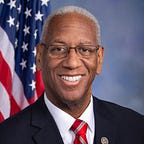Preserving Place, History, Identity
By Congressman A. Donald McEachin
For most of my life, I only knew that my Richmond roots stretched back to my grandfather.
That changed more than three years ago following my work on the African American Burial Grounds Network Act, legislation I am proud to have co-led alongside U.S. Rep. Alma S. Adams, D-N.C.
The bill would help preserve and protect historic African American burial sites across the country. During that process I discovered, to my great surprise, that my ancestors have called Richmond home since the Revolutionary War. In fact, I can trace my family all the way back to that historic Gravel Hill community of slaves freed by Quaker farmer John Pleasants’ will in 1779.
Now, whenever I pass through Varina and the Gravel Hill community, or visit the century-old Gravel Hill Baptist Church, my emotions are profound. The sense of place is palpable. This is home of my ancestors — the home of generations before me, many born into slavery and some who finally achieved freedom.
But if you are African American, you do not need a direct family connection to feel the history when you stand on the hard earth of Gravel Hill and consider the triumphs and tragedies of the men and women who came before.
The land they tilled as free Blacks became the bloody battlefields of Glendale and First Deep Bottom during the Civil War. These battles ravaged pastures and homes and forced them to begin life anew on a devastated landscape. And they did it.
Less than four miles away, thousands of Black men, many of whom had been born into bondage, served in the ranks of the United States Colored Troops, fighting for their new-found freedom during the Battle of New Market Heights in late September 1864.
Hundreds of these patriots died, sacrificing their lives in the ultimate expression of mankind’s desire for freedom. Fourteen received the Medal of Honor for their valor and bravery.
These spaces were important to my ancestors and Indigenous populations in the region and served as critical junctures in American history.
That is why I was gratified to hear that Preservation Virginia’s 2021 list of the commonwealth’s “Most Endangered Historic Places” includes Civil War battlefields on which African American and Native American units bravely fought. Among those selected include New Market Heights in Henrico County and Samaria Baptist Church in Charles City County.
It is critical that we tell these stories, and I support programs like the “Road to Freedom,” developed by Williamsburg-based Civil War Trails in partnership with the American Battlefield Trust. It ties together nearly 100 homes, churches, battlefields, cemeteries and other sites to give perspective on the African American experience in Virginia during the Civil War era.
These types of programs are crucial to a full understanding of these events and their significance. It is imperative that our conservation efforts are inclusive of all of America’s cultural heritage — and that we work to protect historic sites that represent the stories of all Americans.
However, we still have work to do. My African American Burial Grounds Network Act will create a voluntary national network of historic African American burial grounds to provide information, technical support and grants to aid in the research, identification, preservation and restoration of these historic burial sites. Unfortunately, many of these burial grounds have suffered unjust abuse and neglect for centuries.
It is important that we can experience these places so critical to our nation’s history and story. I know that these initiatives can act together as a powerful force to enhance the sense of history and pride of our citizens and help us appreciate even more what it means to be Americans.
